 Tìm kiếm
Tìm kiếm
Chương I Luật xử lý vi phạm hành chính 2012: Các hình thức xử phạt và biện pháp khắc phục hậu quả
| Số hiệu: | 15/2012/QH13 | Loại văn bản: | Luật |
| Nơi ban hành: | Quốc hội | Người ký: | Nguyễn Sinh Hùng |
| Ngày ban hành: | 20/06/2012 | Ngày hiệu lực: | 01/07/2013 |
| Ngày công báo: | 06/08/2012 | Số công báo: | Từ số 479 đến số 480 |
| Lĩnh vực: | Vi phạm hành chính | Tình trạng: | Còn hiệu lực |
TÓM TẮT VĂN BẢN
Điểm mới của Luật xử lý vi phạm hành chính
Ngày 20/6/2012 vừa qua, Quốc hội đã chính thức thông qua Luật xử lý vi phạm hành chính 2012. So với Pháp lệnh xử lý vi phạm hành chính, Luật ra đời có rất nhiều quy định mới, mức xử phạt cũng nặng hơn nhiều so với trước đây.
Theo đó, Luật quy định được phạt cao hơn nhưng tối đa không quá 2 lần mức phạt chung đối với cùng hành vi vi phạm trong 3 lĩnh vực: Giao thông đường bộ; Môi trường; An ninh trật tự, An toàn xã hội, đồng thời chỉ áp dụng tại khu vực nội thành của Thành phố trực thuộc TW. Mức phạt tiền trong xử phạt vi phạm hành chính (VPHC) dao động từ 50 nghìn đồng đến 1 tỷ đồng đối với cá nhân, từ 100 nghìn đồng đến 2 tỷ đồng đối với tổ chức.
Ngoài ra, việc tịch thu tang vật, phương tiện VPHC được áp dụng đối với các VPHC nghiêm trọng do lỗi cố ý của cá nhân, tổ chức. Việc tạm giữ phương tiện, giấy phép, chứng chỉ hành nghề theo thủ tục hành chính chỉ được áp dụng trong trường hợp thật cần thiết và chấm dứt ngay sau khi xác minh được tình tiết làm căn cứ quyết định xử phạt, hành vi vi phạm không còn nguy hiểm cho xã hội.
Bên cạnh đó, Nghị quyết 24/2012/QH13 thi hành Luật này cũng hướng dẫn không áp dụng biện pháp giáo dục tại xã, phường, thị trấn và đưa vào cơ sở chữa bệnh đối với người bán dâm.
Luật xử lý vi phạm hành chính 2012 có hiệu lực kể từ ngày 01/7/2013.
Văn bản tiếng việt
Văn bản tiếng anh
1. Các hình thức xử phạt vi phạm hành chính bao gồm:
a) Cảnh cáo;
b) Phạt tiền;
c) Tước quyền sử dụng giấy phép, chứng chỉ hành nghề có thời hạn hoặc đình chỉ hoạt động có thời hạn;
d) Tịch thu tang vật vi phạm hành chính, phương tiện được sử dụng để vi phạm hành chính (sau đây gọi chung là tang vật, phương tiện vi phạm hành chính);
đ) Trục xuất.
2. Hình thức xử phạt quy định tại điểm a và điểm b khoản 1 Điều này chỉ được quy định và áp dụng là hình thức xử phạt chính.
Hình thức xử phạt quy định tại các điểm c, d và đ khoản 1 Điều này có thể được quy định là hình thức xử phạt bổ sung hoặc hình thức xử phạt chính.
3. Đối với mỗi vi phạm hành chính, cá nhân, tổ chức vi phạm hành chính chỉ bị áp dụng một hình thức xử phạt chính; có thể bị áp dụng một hoặc nhiều hình thức xử phạt bổ sung quy định tại khoản 1 Điều này. Hình thức xử phạt bổ sung chỉ được áp dụng kèm theo hình thức xử phạt chính.
Cảnh cáo được áp dụng đối với cá nhân, tổ chức vi phạm hành chính không nghiêm trọng, có tình tiết giảm nhẹ và theo quy định thì bị áp dụng hình thức xử phạt cảnh cáo hoặc đối với mọi hành vi vi phạm hành chính do người chưa thành niên từ đủ 14 tuổi đến dưới 16 tuổi thực hiện. Cảnh cáo được quyết định bằng văn bản.
1. Mức phạt tiền trong xử phạt vi phạm hành chính từ 50.000 đồng đến 1.000.000.000 đồng đối với cá nhân, từ 100.000 đồng đến 2.000.000.000 đồng đối với tổ chức, trừ trường hợp quy định tại khoản 3 Điều 24 của Luật này.
Đối với khu vực nội thành của thành phố trực thuộc trung ương thì mức phạt tiền có thể cao hơn, nhưng tối đa không quá 02 lần mức phạt chung áp dụng đối với cùng hành vi vi phạm trong các lĩnh vực giao thông đường bộ; bảo vệ môi trường; an ninh trật tự, an toàn xã hội.
2. Chính phủ quy định khung tiền phạt hoặc mức tiền phạt đối với hành vi vi phạm hành chính cụ thể theo một trong các phương thức sau đây, nhưng khung tiền phạt cao nhất không vượt quá mức tiền phạt tối đa quy định tại Điều 24 của Luật này:
a) Xác định số tiền phạt tối thiểu, tối đa;
b) Xác định số lần, tỷ lệ phần trăm của giá trị, số lượng hàng hóa, tang vật vi phạm, đối tượng bị vi phạm hoặc doanh thu, số lợi thu được từ vi phạm hành chính.
3. Căn cứ vào hành vi, khung tiền phạt hoặc mức tiền phạt được quy định tại nghị định của Chính phủ và yêu cầu quản lý kinh tế - xã hội đặc thù của địa phương, Hội đồng nhân dân thành phố trực thuộc trung ương quyết định khung tiền phạt hoặc mức tiền phạt cụ thể đối với hành vi vi phạm trong các lĩnh vực quy định tại đoạn 2 khoản 1 Điều này.
4. Mức tiền phạt cụ thể đối với một hành vi vi phạm hành chính là mức trung bình của khung tiền phạt được quy định đối với hành vi đó; nếu có tình tiết giảm nhẹ thì mức tiền phạt có thể giảm xuống nhưng không được giảm quá mức tối thiểu của khung tiền phạt; nếu có tình tiết tăng nặng thì mức tiền phạt có thể tăng lên nhưng không được vượt quá mức tiền phạt tối đa của khung tiền phạt.
1. Mức phạt tiền tối đa trong các lĩnh vực quản lý nhà nước đối với cá nhân được quy định như sau:
a) Phạt tiền đến 30.000.000 đồng: hôn nhân và gia đình; bình đẳng giới; bạo lực gia đình; lưu trữ; tôn giáo; thi đua khen thưởng; hành chính tư pháp; dân số; vệ sinh môi trường; thống kê;
b) Phạt tiền đến 40.000.000 đồng: an ninh trật tự, an toàn xã hội; phòng, chống tệ nạn xã hội; thi hành án dân sự; phá sản doanh nghiệp, hợp tác xã; giao thông đường bộ; giao dịch điện tử; bưu chính;
c) Phạt tiền đến 50.000.000 đồng: phòng cháy, chữa cháy; cơ yếu; quản lý và bảo vệ biên giới quốc gia; bổ trợ tư pháp; y tế dự phòng; phòng, chống HIV/AIDS; giáo dục; văn hóa; thể thao; du lịch; quản lý khoa học, công nghệ; chuyển giao công nghệ; bảo vệ, chăm sóc trẻ em; bảo trợ, cứu trợ xã hội; phòng chống thiên tai; bảo vệ và kiểm dịch thực vật; quản lý và bảo tồn nguồn gen; sản xuất, kinh doanh giống vật nuôi, cây trồng; thú y; kế toán; kiểm toán độc lập; phí, lệ phí; quản lý tài sản công; hóa đơn; dự trữ quốc gia; điện lực; hóa chất; khí tượng thủy văn; đo đạc bản đồ; đăng ký kinh doanh;
d) Phạt tiền đến 75.000.000 đồng: quốc phòng, an ninh quốc gia; lao động; dạy nghề; giao thông đường sắt; giao thông đường thủy nội địa; bảo hiểm y tế; bảo hiểm xã hội;
đ) Phạt tiền đến 100.000.000 đồng: quản lý công trình thuỷ lợi; đê điều; khám bệnh, chữa bệnh; mỹ phẩm; dược, trang thiết bị y tế; sản xuất, kinh doanh thức ăn chăn nuôi, phân bón; quảng cáo; đặt cược và trò chơi có thưởng; quản lý lao động ngoài nước; giao thông hàng hải; giao thông hàng không dân dụng; quản lý và bảo vệ công trình giao thông; công nghệ thông tin; viễn thông; tần số vô tuyến điện; báo chí; xuất bản; thương mại; bảo vệ quyền lợi người tiêu dùng; hải quan, thủ tục thuế; kinh doanh xổ số; kinh doanh bảo hiểm; thực hành tiết kiệm, chống lãng phí; quản lý vật liệu nổ; bảo vệ nguồn lợi thuỷ sản, hải sản;
e) Phạt tiền đến 150.000.000 đồng: quản lý giá; kinh doanh bất động sản; khai thác, sản xuất, kinh doanh vật liệu xây dựng; quản lý công trình hạ tầng kỹ thuật; quản lý, phát triển nhà và công sở; đấu thầu; đầu tư;
g) Phạt tiền đến 200.000.000 đồng: sản xuất, buôn bán hàng cấm, hàng giả;
h) Phạt tiền đến 250.000.000 đồng: điều tra, quy hoạch, thăm dò, khai thác, sử dụng nguồn tài nguyên nước;
i) Phạt tiền đến 500.000.000 đồng: xây dựng; quản lý rừng, lâm sản; đất đai;
k) Phạt tiền đến 1.000.000.000 đồng: quản lý các vùng biển, đảo và thềm lục địa của nước Cộng hòa xã hội chủ nghĩa Việt Nam; quản lý hạt nhân và chất phóng xạ, năng lượng nguyên tử; tiền tệ, kim loại quý, đá quý, ngân hàng, tín dụng; thăm dò, khai thác dầu khí và các loại khoáng sản khác; bảo vệ môi trường.
2. Mức phạt tiền tối đa trong lĩnh vực quản lý nhà nước quy định tại khoản 1 Điều này đối với tổ chức bằng 02 lần mức phạt tiền đối với cá nhân.
3. Mức phạt tiền tối đa trong các lĩnh vực thuế; đo lường; sở hữu trí tuệ; an toàn thực phẩm; chất lượng sản phẩm, hàng hóa; chứng khoán; hạn chế cạnh tranh theo quy định tại các luật tương ứng.
4. Mức phạt tiền tối đa đối với lĩnh vực mới chưa được quy định tại khoản 1 Điều này do Chính phủ quy định sau khi được sự đồng ý của Ủy ban thường vụ Quốc hội.
1. Tước quyền sử dụng giấy phép, chứng chỉ hành nghề có thời hạn là hình thức xử phạt được áp dụng đối với cá nhân, tổ chức vi phạm nghiêm trọng các hoạt động được ghi trong giấy phép, chứng chỉ hành nghề. Trong thời gian bị tước quyền sử dụng giấy phép, chứng chỉ hành nghề, cá nhân, tổ chức không được tiến hành các hoạt động ghi trong giấy phép, chứng chỉ hành nghề.
2. Đình chỉ hoạt động có thời hạn là hình thức xử phạt được áp dụng đối với cá nhân, tổ chức vi phạm hành chính trong các trường hợp sau:
a) Đình chỉ một phần hoạt động gây hậu quả nghiêm trọng hoặc có khả năng thực tế gây hậu quả nghiêm trọng đối với tính mạng, sức khỏe con người, môi trường của cơ sở sản xuất, kinh doanh, dịch vụ mà theo quy định của pháp luật phải có giấy phép;
b) Đình chỉ một phần hoặc toàn bộ hoạt động sản xuất, kinh doanh, dịch vụ hoặc hoạt động khác mà theo quy định của pháp luật không phải có giấy phép và hoạt động đó gây hậu quả nghiêm trọng hoặc có khả năng thực tế gây hậu quả nghiêm trọng đối với tính mạng, sức khỏe con người, môi trường và trật tự, an toàn xã hội.
3. Thời hạn tước quyền sử dụng giấy phép, chứng chỉ hành nghề, thời hạn đình chỉ hoạt động quy định tại khoản 1 và khoản 2 Điều này từ 01 tháng đến 24 tháng, kể từ ngày quyết định xử phạt có hiệu lực thi hành. Người có thẩm quyền xử phạt giữ giấy phép, chứng chỉ hành nghề trong thời hạn tước quyền sử dụng giấy phép, chứng chỉ hành nghề.
Tịch thu tang vật, phương tiện vi phạm hành chính là việc sung vào ngân sách nhà nước vật, tiền, hàng hoá, phương tiện có liên quan trực tiếp đến vi phạm hành chính, được áp dụng đối với vi phạm hành chính nghiêm trọng do lỗi cố ý của cá nhân, tổ chức.
Việc xử lý tang vật, phương tiện vi phạm hành chính bị tịch thu được thực hiện theo quy định tại Điều 82 của Luật này.
1. Trục xuất là hình thức xử phạt buộc người nước ngoài có hành vi vi phạm hành chính tại Việt Nam phải rời khỏi lãnh thổ nước Cộng hoà xã hội chủ nghĩa Việt Nam.
2. Chính phủ quy định chi tiết việc áp dụng hình thức xử phạt trục xuất.
1. Các biện pháp khắc phục hậu quả bao gồm:
a) Buộc khôi phục lại tình trạng ban đầu;
b) Buộc tháo dỡ công trình, phần công trình xây dựng không có giấy phép hoặc xây dựng không đúng với giấy phép;
c) Buộc thực hiện biện pháp khắc phục tình trạng ô nhiễm môi trường, lây lan dịch bệnh;
d) Buộc đưa ra khỏi lãnh thổ nước Cộng hòa xã hội chủ nghĩa Việt Nam hoặc tái xuất hàng hoá, vật phẩm, phương tiện;
đ) Buộc tiêu hủy hàng hóa, vật phẩm gây hại cho sức khỏe con người, vật nuôi, cây trồng và môi trường, văn hóa phẩm có nội dung độc hại;
e) Buộc cải chính thông tin sai sự thật hoặc gây nhầm lẫn;
g) Buộc loại bỏ yếu tố vi phạm trên hàng hoá, bao bì hàng hóa, phương tiện kinh doanh, vật phẩm;
h) Buộc thu hồi sản phẩm, hàng hóa không bảo đảm chất lượng;
i) Buộc nộp lại số lợi bất hợp pháp có được do thực hiện vi phạm hành chính hoặc buộc nộp lại số tiền bằng trị giá tang vật, phương tiện vi phạm hành chính đã bị tiêu thụ, tẩu tán, tiêu hủy trái quy định của pháp luật;
k) Các biện pháp khắc phục hậu quả khác do Chính phủ quy định.
2. Nguyên tắc áp dụng biện pháp khắc phục hậu quả:
a) Đối với mỗi vi phạm hành chính, ngoài việc bị áp dụng hình thức xử phạt, cá nhân, tổ chức vi phạm hành chính có thể bị áp dụng một hoặc nhiều biện pháp khắc phục hậu quả quy định tại khoản 1 Điều này;
b) Biện pháp khắc phục hậu quả được áp dụng độc lập trong trường hợp quy định tại khoản 2 Điều 65 của Luật này.
Cá nhân, tổ chức vi phạm hành chính phải khôi phục lại tình trạng ban đầu đã bị thay đổi do vi phạm hành chính của mình gây ra; nếu cá nhân, tổ chức vi phạm hành chính không tự nguyện thực hiện thì bị cưỡng chế thực hiện.
Cá nhân, tổ chức vi phạm hành chính phải thực hiện biện pháp để khắc phục tình trạng ô nhiễm môi trường, lây lan dịch bệnh; nếu cá nhân, tổ chức vi phạm hành chính không tự nguyện thực hiện thì bị cưỡng chế thực hiện.
Cá nhân, tổ chức vi phạm hành chính phải đưa ra khỏi lãnh thổ nước Cộng hòa xã hội chủ nghĩa Việt Nam hoặc tái xuất hàng hoá, vật phẩm, phương tiện được đưa vào lãnh thổ nước Cộng hòa xã hội chủ nghĩa Việt Nam, nhập khẩu trái với quy định của pháp luật hoặc được tạm nhập, tái xuất nhưng không tái xuất theo đúng quy định của pháp luật.
Biện pháp khắc phục hậu quả này cũng được áp dụng đối với hàng hóa nhập khẩu, quá cảnh xâm phạm quyền sở hữu trí tuệ, hàng hóa giả mạo quyền sở hữu trí tuệ, phương tiện, nguyên liệu, vật liệu nhập khẩu được sử dụng chủ yếu để sản xuất, kinh doanh hàng hóa giả mạo về sở hữu trí tuệ sau khi đã loại bỏ yếu tố vi phạm; nếu cá nhân, tổ chức vi phạm hành chính không tự nguyện thực hiện thì bị cưỡng chế thực hiện.
Cá nhân, tổ chức vi phạm hành chính phải tiêu hủy hàng hóa, vật phẩm gây hại cho sức khoẻ con người, vật nuôi, cây trồng và môi trường, văn hoá phẩm có nội dung độc hại hoặc tang vật khác thuộc đối tượng bị tiêu hủy theo quy định của pháp luật; nếu cá nhân, tổ chức vi phạm hành chính không tự nguyện thực hiện thì bị cưỡng chế thực hiện.
Cá nhân, tổ chức vi phạm hành chính phải cải chính thông tin sai sự thật hoặc gây nhầm lẫn đã được công bố, đưa tin trên chính phương tiện thông tin đại chúng, trang thông tin điện tử đã công bố, đưa tin; nếu cá nhân, tổ chức vi phạm hành chính không tự nguyện thực hiện thì bị cưỡng chế thực hiện.
Cá nhân, tổ chức sản xuất, kinh doanh hàng hóa hoặc sử dụng phương tiện kinh doanh, vật phẩm chứa yếu tố vi phạm trên hàng hóa, bao bì hàng hóa, phương tiện kinh doanh, vật phẩm thì phải loại bỏ các yếu tố vi phạm đó; nếu cá nhân, tổ chức vi phạm hành chính không tự nguyện thực hiện thì bị cưỡng chế thực hiện.
Cá nhân, tổ chức sản xuất, kinh doanh sản phẩm, hàng hóa không bảo đảm chất lượng đã đăng ký hoặc công bố và hàng hóa khác không bảo đảm chất lượng, điều kiện lưu thông thì phải thu hồi các sản phẩm, hàng hóa vi phạm đang lưu thông trên thị trường; nếu cá nhân, tổ chức vi phạm hành chính không tự nguyện thực hiện thì bị cưỡng chế thực hiện.
Cá nhân, tổ chức vi phạm phải nộp lại số lợi bất hợp pháp là tiền, tài sản, giấy tờ và vật có giá có được từ vi phạm hành chính mà cá nhân, tổ chức đó đã thực hiện để sung vào ngân sách nhà nước hoặc hoàn trả cho đối tượng bị chiếm đoạt; phải nộp lại số tiền bằng với giá trị tang vật, phương tiện vi phạm hành chính nếu tang vật, phương tiện đó đã bị tiêu thụ, tẩu tán, tiêu hủy trái quy định của pháp luật; nếu cá nhân, tổ chức vi phạm hành chính không tự nguyện thực hiện thì bị cưỡng chế thực hiện.
SANCTIONING FORMS AND REMEDIAL MEASURES
Article 21. Sanctioning forms and application principles
1. Forms of administrative sanctions include:
a) Warning;
b) Fines;
c) Stripping off the right to use permits, professional practice certificates in a definite term; or suspension of operation in a definite term;
d) Confiscating material evidences, means of administrative violation used to commit administrative violations (hereinafter called material evidences, means of administrative violation);
e) Expulsion;
2. Sanctioning forms specified in point a and point b, Clause 1 of this Article shall be defined and applied as principal sanctioning forms.
Sanctioning forms specified in the points c, d and e, Clause 1 of this Article may be specified as additional sanctioning forms or principal sanctioning forms.
3. For each act of administrative violations, individuals, organizations committing administrative violations shall be applied one principal sanctioning form; may be applied one or more additional sanctioning forms specified in Clause 1 of this Article. The additional sanctioning forms are only applied together with the principal ones.
Warning shall be applied to individuals and organizations that commit minor administrative violations, with extenuating circumstances and shall be applied warning form according to the regulations, or to all acts of administrative violations committed by minors aged between full 14 and fewer than 16. Warning shall be decided in writing.
1. The fine levels in sanctioning administrative violations range from VND 50,000 to VND 1,000,000,000 for individuals, VND 100,000 to VND 2,000,000 for organizations, except for those regulated in Clause 3, Article 24 of this Law.
For urban areas of central cities, the fine levels may be higher, but not exceeding 02 times compared with the common levels applied for the same violations in the fields of road traffic; environmental protection; security, order and social security.
2. The Government shall regulate the frame of fine levels or fines for specific administrative violations according to one of the following methods, but the highest fine frame does not exceed the maximum fine level specified in Article 24 of this Law:
a) Defining the minimum, the maximum fines;
b) Defining the number of times, the percentage of the value and quantity of violation goods, material evidences, violated subjects or revenue, interest earned from acts of administrative violations.
3. Based on the behavior, frame of fines or the fine levels specified in the decree of the Government and requirements of characteristic socio-economic management of the localities, the People’s Councils of the centrally-affiliated cities shall define the frame of fines or the specific fine levels for violations in the fields regulated in paragraph 2, Clause 1 of this Article.
4. The specific fine level for an act of administrative violation is the average level of the fine frame prescribed for such violation; if there are extenuating circumstances, the fine level may be reduced but not lower than minimum level of the fine frame; if there are aggravating circumstances, the fine may be increased but not higher than the maximum fine level of the fine frame.
Article 24. The maximum fine levels in fields
1. The maximum fine level in the fields of state management for individuals shall be regulated as follows:
a) A fine of up to VND 30,000,000: marriage and family; gender equality; domestic violence; storage; religion; emulation; justice administration; population; environmental hygiene; statistics;
b) A fine of up to VND 40,000,000: security, order, social security; prevention of social evils; civil judgment; enterprises and cooperatives bankruptcy; road traffic; electronic transactions; postal service;
c) A fine of up to VND 50,000,000: fire fighting and prevention; cipher, management and protection of national borders; judicial assistance; preventive medical activities; HIV / AIDS prevention; education; culture; sports; tourism; management of science and technology; technology transfer; children protection and care; social sponsor and relief; natural disaster prevention; plants protection and quarantine; management and conservation of genetic resources; manufacturing and trading breeding of animals and plants; veterinary; accounting; independent audit; charges, fees; public asset management; invoices; national reserve; electricity; chemicals; hydrometeorology; cartography; business registration;
d) A fine of up to VND 75,000,000: national security and defense; labor; vocational training; railway traffic; inland waterway traffic; health insurance; social insurance;
dd) A fine of VND 100,000,000: irrigation works management; dykes; medical examination and treatment; cosmetics; pharmacy and medical equipment; production and trading of animal feed and fertilizers; advertising; betting and games with awards; overseas labor management; maritime traffic; civil air traffic; management and protection of traffic works; information technology; telecommunications; radio frequency; press; publish; trade; protecting the benefits of consumers; customs, tax procedures; lottery business; insurance business; practicing thrift, combating waste; management of explosive materials; protecting aquatic resources and marine products;
e) A fine of up to VND 150 million: price management; real estate trading; mining, manufacturing and trading the building materials; technical infrastructure management; management, development of housing and office buildings; bidding; investment;
g) A fine of up to VND 200,000,000: production, trading forbidden goods, fake goods;
h) A fine of up to VND 250 million: survey, planning, exploration, exploitation and use of water resources;
i) A fine of up to VND 500,000,000: construction; management of forest and forest products; land;
k) A fine of up to VND 1 billion: the management of the sea areas, islands and continental shelves of the Socialist Republic of Vietnam; nuclear and radioactive materials management, nuclear energy; currency, precious metals, precious stones, banking and credit; exploration and exploitation of oil and gas and other minerals; environmental protection.
2. The maximum fine level in the field of State management specified in Clause 1 of this Article for organizations shall be 02 times compared with the fine level for individuals.
3. The maximum fine in the field of taxation; measurement; intellectual property; food safety; quality of products and goods; securities; restricting competition comply with the respective laws.
4. The maximum fine levels for the new fields have not been defined in Clause 1 of this Article shall be prescribed by the State after obtaining the consent of the National Assembly Standing Committee.
Article 25. The definite deprivation of the right to use licenses, professional practice certificates or suspension of operation in definite time
1. The definite deprivation of the right to use licenses or professional practice certificates shall apply to individuals and organizations that have seriously violated the activities written in the licenses, professional practice certificates. While being deprived of the right to use licenses and/or professional practice certificates, individuals and organizations must not carry out activities prescribed in the licenses or professional practice certificates.
2. The suspension of operation in definite time is the sanctioning form that is applied for individuals, organizations committing acts of administrative violations in the following cases:
a) Partly suspension of operation causing serious consequences or practically causing serious consequences to the life, human health, environment for facilities manufacturing, trading and supplying services being required to possess licenses according to the law regulations.
b) Partly or entirely suspension of manufacturing, trading, supplying services or other activities causing serious consequences or practically causing serious consequences to the life, human health, environment and order, social safety, that are required to possess licenses according to the law regulations.
3. The time limit of deprivation of the right to use licenses or professional practice certificates, time limit of operation suspension specified in Clause 1 and Clause 2 of this Article are from 01 month to 24 months, as the date when sanctioning decision takes effect. The competent persons in sanctioning hold the licenses or professional practice certificates during the deprivation term.
Article 26. Confiscation of material evidences and means used for commission of administrative violations
1. Confiscating material evidences and means used to commit administrative violations means the requisition of things, money, goods and/or means directly involved in the administrative violations into the State fund; applied for serious administrative violations due to the intentional fault of individuals, organizations.
The handling of confiscated material evidences and means of administrative violations shall comply with the provisions of Article 82 of this Law.
1. Expulsion means compelling foreigners who have committed acts of administrative violations in Vietnam to leave the territory of the Socialist Republic of Vietnam.
2. The Government shall prescribe in details application of sanctioning forms for expulsion.
Article 28. Remedial measures and application principles
1. Remedial measures include:
a) Forcible restoration of the initial state;
b) Forcible dismantling of works, parts of works constructed without permits or not proper with permits;
c) Forcible application of measures to overcome the environmental pollution, epidemic spreads;
d) Forcible bringing out of the territory of the Socialist Republic of Vietnam or forcible re-export of goods, articles and means;
dd) Forcible destruction of goods, articles which cause harms to human health, domestic animals and cultivated plants, environment and harmful cultural products;
e) Forcible correction of false information or misleading;
g) Forcible removal of infringing elements on the goods or packaging of goods, means of trading, and articles;
h) Forcible recall of products, goods without quality guarantee;
i) Forcible submit of the unlawful profits from administrative violations or forced to submit the money equivalent to the value of material evidences, means used to commit administrative violations which have been sold, dispersed or destroyed contrary to the law provisions;
k) Other remedial measures prescribed by the Government.
2. Application principles of remedial measures:
a) For each act of administrative violation, in addition to being applied sanctions, individuals, organizations committing administrative violations may be applied one or more remedial measures specified in Clause 1 of this Article;
b) Remedial measures are applied independently for cases specified in Clause 2, Article 65 of this Law.
Article 29. Forcible restoration of the initial state
Individuals, organizations committing administrative violations must restore the initial state altered due to their acts of administrative violations; in case individuals, organizations committing administrative violations do not voluntarily carry out their duties, they shall be coerced to carry out their duties.
Article 30. Forcible dismantling of works, parts of works constructed without building permits or not proper with building permits
Individuals, organizations committing administrative violations must dismantle works, parts of works constructed without building permits or not proper with building permits; in case individuals, organizations committing administrative violations do not voluntarily carry out their duties, they shall be coerced to carry out their duties.
Article 31. Forcible application of measures to overcome the environmental pollution, epidemic spreads
Individuals, organizations committing administrative violations must implement measures to overcome the environmental pollution, epidemic spreads; in case individuals, organizations committing administrative violations do not voluntarily carry out their duties, they shall be coerced to carry out their duties.
Article 32. Forcible bringing out of the territory of the Socialist Republic of Vietnam or forcible re-export of goods, articles and means
Individuals, organizations committing administrative violations must bring out of the territory of the Socialist Republic of Vietnam or re-export goods, articles and means brought into the territory of the Socialist Republic of Vietnam, imported contrary to the provisions of law or temporary import for re-export, but not re-export in accordance with the provisions of the law.
This remedial measure is also applied to goods imported, transited which infringe upon intellectual property rights, fake goods infringe upon intellectual property rights, import means, raw materials and materials used primarily for the production and trading of intellectual property counterfeit goods, after the removal of offending elements; in case individuals, organizations committing administrative violations do not voluntarily carry out their duties, they shall be coerced to carry out their duties.
Articles 33. Forcible destruction of goods, articles which cause harms to human health, domestic animals and cultivated plants, and environment, harmful cultural products;
Individuals, organizations committing administrative violations must destroy articles which cause harms to human health, domestic animals and cultivated plants, environment and harmful cultural products or other material evidences belong to groups of being destroyed according to the law provisions; in case individuals, organizations committing administrative violations do not voluntarily carry out their duties, they shall be coerced to carry out their duties.
Article 34. Forcible correction of false information or misleading
Individuals, organizations committing administrative violations must correct false information or misleading which have been announced, informed on the mass media, being announced, informed on websites; in case individuals, organizations committing administrative violations do not voluntarily carry out their duties, they shall be coerced to carry out their duties.
Article 35. Forcible removal of infringing elements on the goods or packaging of goods, means of trading, and articles;
Individuals, organizations who manufacture, trade goods or use means of trading, articles which contain the infringing elements on the goods, packaging of goods, means of trading, articles must remove those infringing elements; in case individuals, organizations committing administrative violations do not voluntarily carry out their duties, they shall be coerced to carry out their duties.
Article 36. Forcible recall of products, goods without quality guarantee
Individuals, organizations manufacturing, trading products, goods which do not meet registered or announced quality and other goods without quality guarantee, conditions of circulation in the market; in case individuals, organizations committing administrative violations do not voluntarily carry out their duties, they shall be coerced to carry out their duties.
Article 37. Forcible submit of the unlawful profits from administrative violations or forced to submit the money equivalent to the value of exhibit, means used to commit administrative violations which have been sold, dispersed or destroyed contrary to the law provisions
The violating individuals, organizations must submit the unlawful profits under the forms of money, valuable papers and articles getting from the administrative violations to the State budget or return to the subjects being appropriated; must submit the money equivalent to the value of material evidences, means used to commit administrative violations in case such material evidences, means have been sold, dispersed or destroyed contrary to the law provisions; if individuals, organizations committing administrative violations do not voluntarily carry out their duties, they shall be coerced to carry out their duties.
Văn bản liên quan
Cập nhật
Điều 3. Nguyên tắc xử lý vi phạm hành chính
Điều 6. Thời hiệu xử lý vi phạm hành chính
Điều 12. Những hành vi bị nghiêm cấm
Điều 17. Trách nhiệm quản lý công tác thi hành pháp luật về xử lý vi phạm hành chính
Điều 18. Trách nhiệm của thủ trưởng cơ quan, đơn vị trong công tác xử lý vi phạm hành chính
Điều 21. Các hình thức xử phạt và nguyên tắc áp dụng
Điều 24. Mức phạt tiền tối đa trong các lĩnh vực
Điều 26. Tịch thu tang vật, phương tiện vi phạm hành chính
Điều 28. Các biện pháp khắc phục hậu quả và nguyên tắc áp dụng
Điều 38. Thẩm quyền của Chủ tịch Ủy ban nhân dân
Điều 39. Thẩm quyền của Công an nhân dân
Điều 40. Thẩm quyền của Bộ đội biên phòng
Điều 41. Thẩm quyền của Cảnh sát biển
Điều 43. Thẩm quyền của Kiểm lâm
Điều 44. Thẩm quyền của cơ quan Thuế
Điều 45. Thẩm quyền của Quản lý thị trường
Điều 46. Thẩm quyền của Thanh tra
Điều 47. Thẩm quyền của Cảng vụ hàng hải, Cảng vụ hàng không, Cảng vụ đường thuỷ nội địa
Điều 48. Thẩm quyền của Toà án nhân dân
Điều 49. Thẩm quyền của cơ quan thi hành án dân sự
Điều 62. Chuyển hồ sơ vụ vi phạm có dấu hiệu tội phạm để truy cứu trách nhiệm hình sự
Điều 63. Chuyển hồ sơ vụ vi phạm để xử phạt hành chính
Điều 65. Những trường hợp không ra quyết định xử phạt vi phạm hành chính
Điều 68. Nội dung quyết định xử phạt vi phạm hành chính
Điều 71. Chuyển quyết định xử phạt để tổ chức thi hành
Điều 74. Thời hiệu thi hành quyết định xử phạt vi phạm hành chính
Điều 78. Thủ tục nộp tiền phạt
Điều 79. Nộp tiền phạt nhiều lần
Điều 81. Thủ tục tịch thu tang vật, phương tiện vi phạm hành chính
Điều 86. Cưỡng chế thi hành quyết định xử phạt vi phạm hành chính
Điều 88. Thi hành quyết định cưỡng chế
Điều 94. Đối tượng áp dụng biện pháp đưa vào cơ sở giáo dục bắt buộc
Điều 96. Đối tượng áp dụng biện pháp đưa vào cơ sở cai nghiện bắt buộc
Điều 97. Lập hồ sơ đề nghị áp dụng biện pháp giáo dục tại xã, phường, thị trấn
Điều 98. Quyết định áp dụng biện pháp giáo dục tại xã, phường, thị trấn
Điều 99. Lập hồ sơ đề nghị áp dụng biện pháp đưa vào trường giáo dưỡng
Điều 101. Lập hồ sơ đề nghị áp dụng biện pháp đưa vào cơ sở giáo dục bắt buộc
Điều 103. Lập hồ sơ đề nghị áp dụng biện pháp đưa vào cơ sở cai nghiện bắt buộc
Điều 122. Tạm giữ người theo thủ tục hành chính
Điều 123. Thẩm quyền tạm giữ người theo thủ tục hành chính
Điều 124. Áp giải người vi phạm
Điều 125. Tạm giữ tang vật, phương tiện, giấy phép, chứng chỉ hành nghề theo thủ tục hành chính
Điều 128. Khám phương tiện vận tải, đồ vật theo thủ tục hành chính
Điều 129. Khám nơi cất giấu tang vật, phương tiện vi phạm hành chính
Điều 5. Đối tượng bị xử lý vi phạm hành chính
Điều 18. Trách nhiệm của thủ trưởng cơ quan, đơn vị trong công tác xử lý vi phạm hành chính
Điều 66. Thời hạn ra quyết định xử phạt vi phạm hành chính
Điều 125. Tạm giữ tang vật, phương tiện, giấy phép, chứng chỉ hành nghề theo thủ tục hành chính
Điều 128. Khám phương tiện vận tải, đồ vật theo thủ tục hành chính
Điều 3. Nguyên tắc xử lý vi phạm hành chính
Điều 5. Đối tượng bị xử lý vi phạm hành chính
Điều 18. Trách nhiệm của thủ trưởng cơ quan, đơn vị trong công tác xử lý vi phạm hành chính
Điều 28. Các biện pháp khắc phục hậu quả và nguyên tắc áp dụng
Điều 46. Thẩm quyền của Thanh tra
Điều 83. Quản lý tiền thu từ xử phạt vi phạm hành chính, chứng từ thu, nộp tiền phạt
Điều 5. Đối tượng bị xử lý vi phạm hành chính
Điều 21. Các hình thức xử phạt và nguyên tắc áp dụng
Điều 97. Lập hồ sơ đề nghị áp dụng biện pháp giáo dục tại xã, phường, thị trấn
Điều 99. Lập hồ sơ đề nghị áp dụng biện pháp đưa vào trường giáo dưỡng
Điều 101. Lập hồ sơ đề nghị áp dụng biện pháp đưa vào cơ sở giáo dục bắt buộc
Bài viết liên quan
Nồng độ cồn xe máy bao nhiêu thì không bị phạt mới nhất 2025?
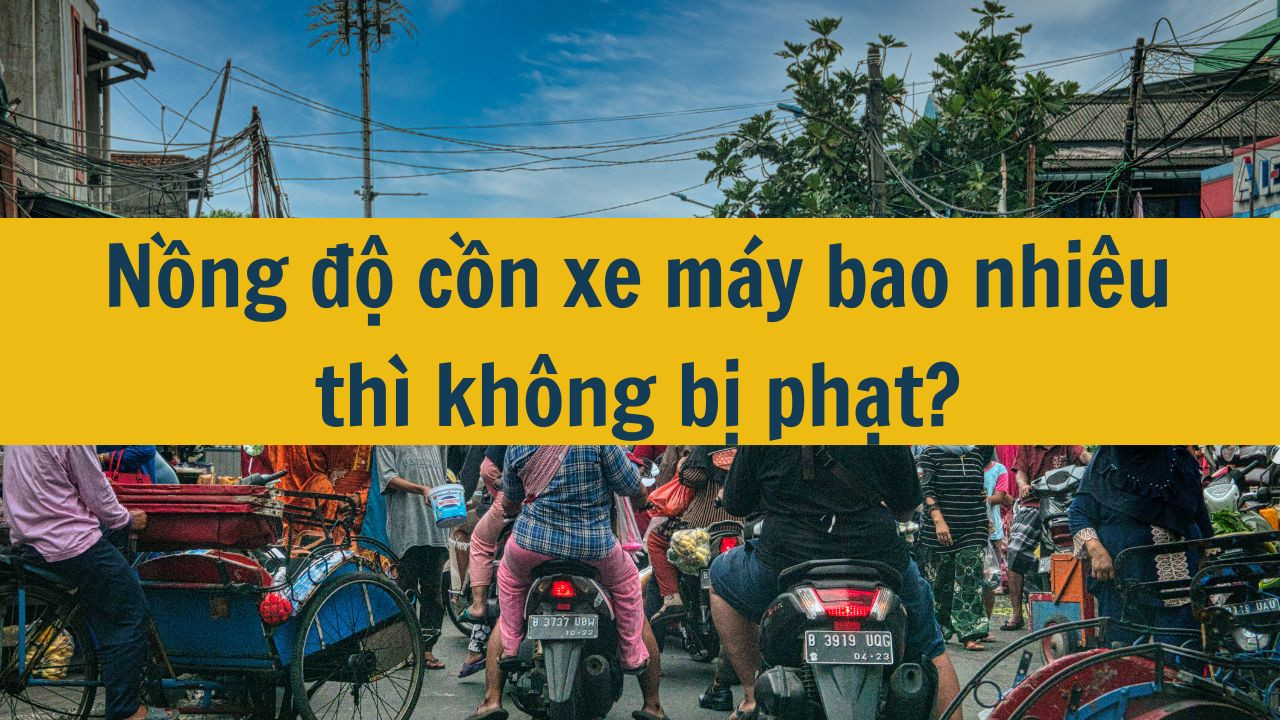
Nồng độ cồn xe máy bao nhiêu thì không bị phạt mới nhất 2025?
Nồng độ cồn bao nhiêu khi lái xe máy thì không bị phạt? Đây là câu hỏi nhiều người thắc mắc khi tham gia giao thông sau khi uống rượu bia. Bài viết này sẽ cung cấp thông tin chi tiết về mức nồng độ cồn cho phép theo quy định pháp luật Việt Nam hiện hành, giúp bạn hiểu rõ và tránh vi phạm khi điều khiển phương tiện. 21/01/2025Nồng độ cồn bao nhiêu thì bị phạt vi phạm giao thông mới nhất 2025?
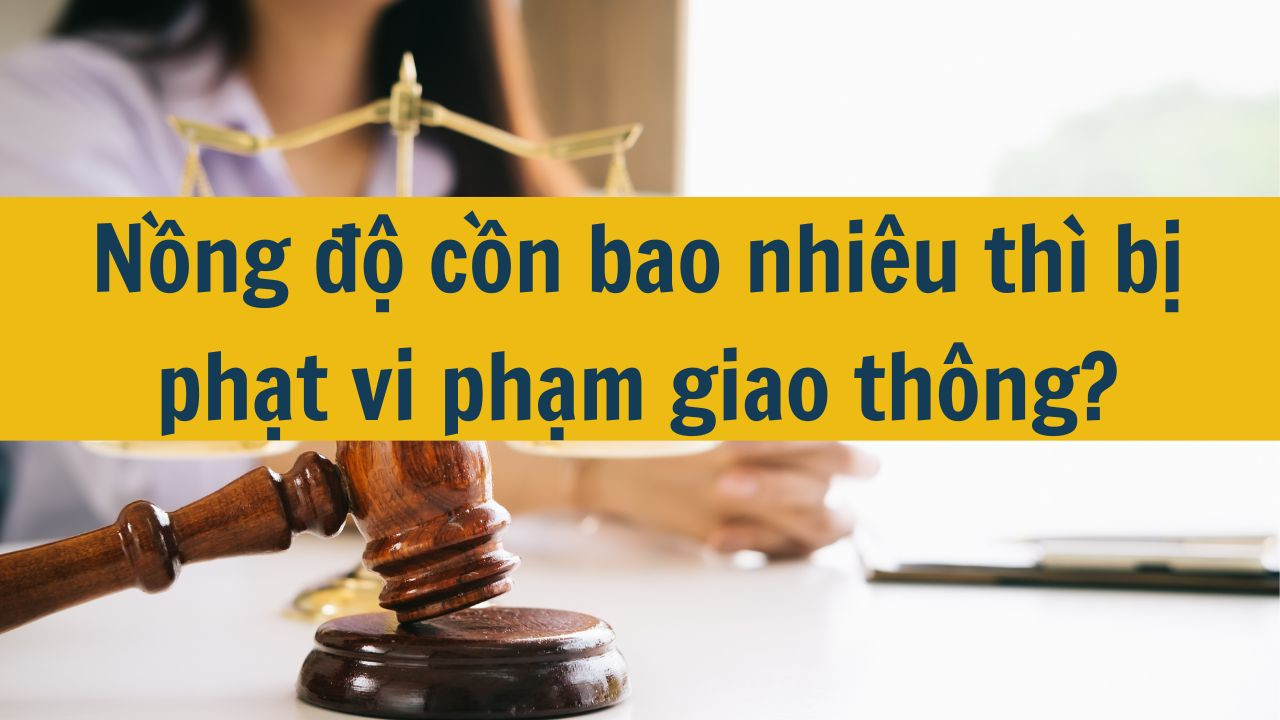
Nồng độ cồn bao nhiêu thì bị phạt vi phạm giao thông mới nhất 2025?
Nồng độ cồn bao nhiêu thì bị phạt vi phạm giao thông? Đây là câu hỏi được nhiều người quan tâm, đặc biệt khi các quy định xử phạt vi phạm nồng độ cồn ngày càng nghiêm ngặt. Bài viết này sẽ cung cấp thông tin chi tiết về mức nồng độ cồn cho phép, các mức xử phạt tương ứng và những lưu ý quan trọng để bạn tham gia giao thông an toàn và đúng luật. 21/01/2025Nồng độ cồn là gì? Có nồng độ cồn dưới ngưỡng vi phạm thì có bị phạt không mới nhất 2025?
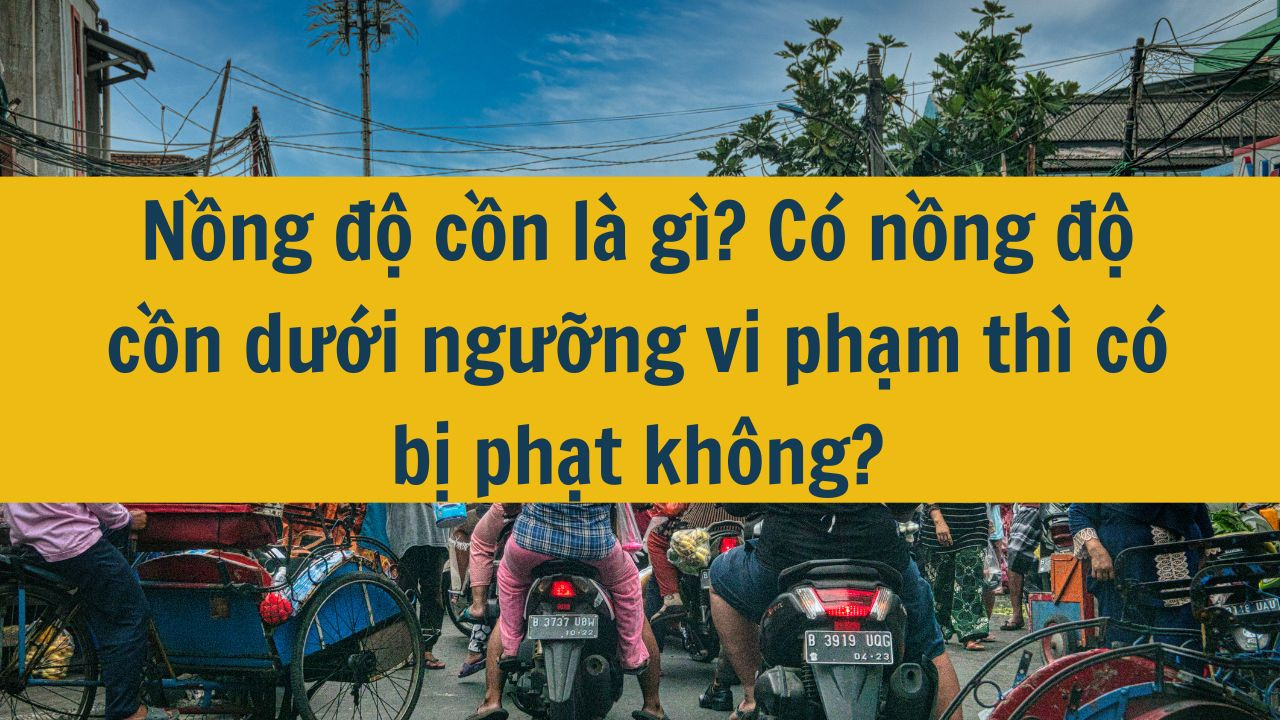
Nồng độ cồn là gì? Có nồng độ cồn dưới ngưỡng vi phạm thì có bị phạt không mới nhất 2025?
Nồng độ cồn là gì? Có nồng độ cồn dưới ngưỡng vi phạm thì có bị phạt không? Đây là câu hỏi mà nhiều người tham gia giao thông quan tâm. Bài viết này sẽ giải thích rõ khái niệm nồng độ cồn, quy định pháp luật hiện hành và mức xử phạt khi điều khiển phương tiện giao thông có nồng độ cồn dưới ngưỡng quy định. Cùng tìm hiểu để lái xe an toàn và đúng pháp luật! 21/01/2025Uống rượu bia mà nồng độ cồn 0,096 miligam/1 lít khí thở khi lái xe máy tham gia giao thông sẽ bị xử phạt thế nào mới nhất 2025?
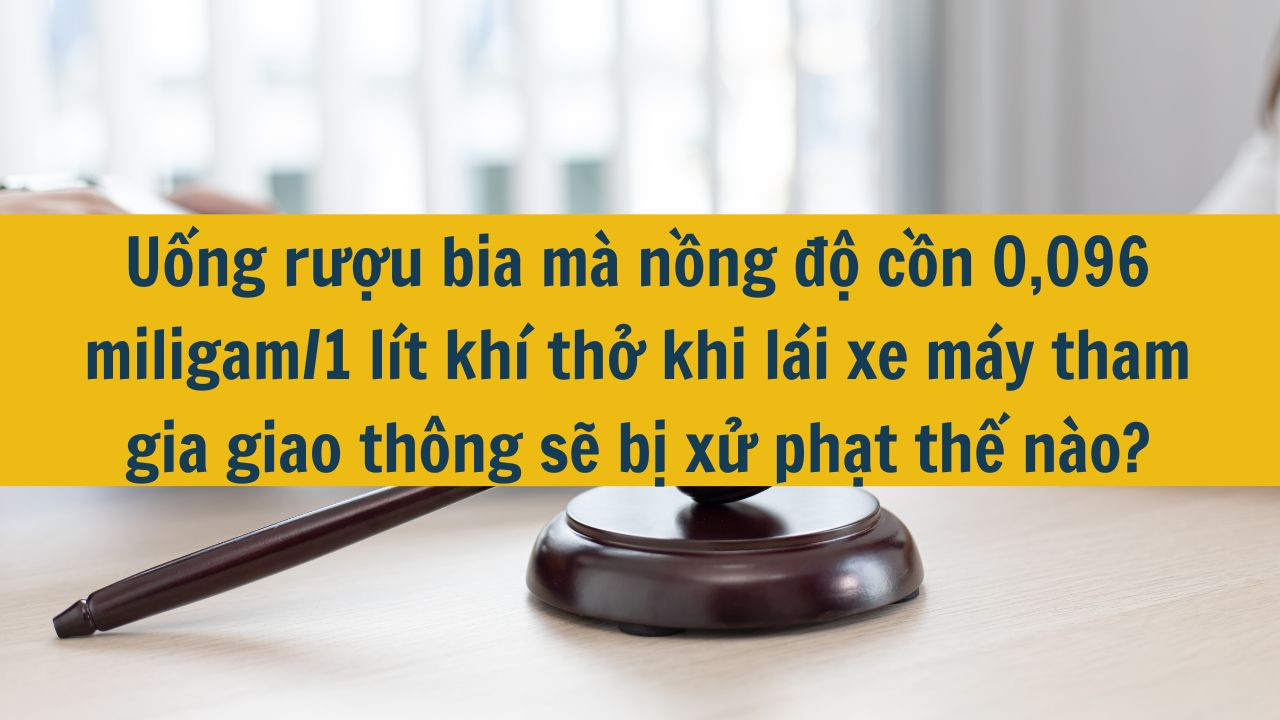
Uống rượu bia mà nồng độ cồn 0,096 miligam/1 lít khí thở khi lái xe máy tham gia giao thông sẽ bị xử phạt thế nào mới nhất 2025?
Việc điều khiển xe máy khi trong hơi thở có nồng độ cồn 0,096 miligam/lít khí thở vi phạm quy định pháp luật về an toàn giao thông đường bộ. Vậy với mức vi phạm này, người lái xe sẽ bị xử phạt như thế nào? Bài viết dưới đây sẽ cung cấp thông tin chi tiết về mức phạt, các hình thức xử lý và những lưu ý quan trọng mà người tham gia giao thông cần biết. 21/01/2025Quy định nào cấm lái xe khi đã uống rượu bia mới nhất 2025?
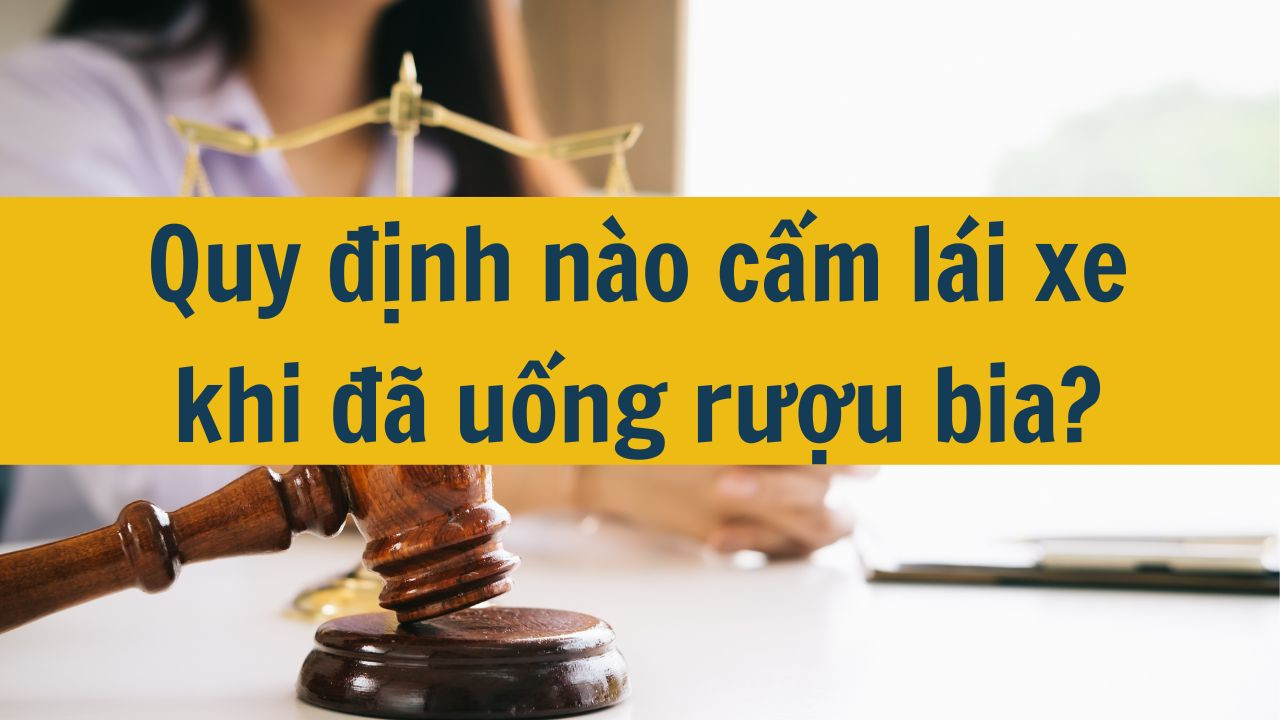
Quy định nào cấm lái xe khi đã uống rượu bia mới nhất 2025?
Lái xe sau khi uống rượu bia là hành vi bị pháp luật nghiêm cấm nhằm đảm bảo an toàn giao thông và tính mạng con người. Vậy quy định cụ thể nào cấm lái xe khi đã sử dụng rượu bia? Mức xử phạt đối với người vi phạm ra sao? Hãy cùng tìm hiểu chi tiết trong bài viết dưới đây để nắm rõ quy định và tránh những hậu quả đáng tiếc 21/01/2025Uống rượu bia bao nhiêu thì sẽ không bị phạt khi lái xe máy tham gia giao thông? Hay tất cả trường hợp có uống rượu bia đều bị phạt mới nhất 2025?
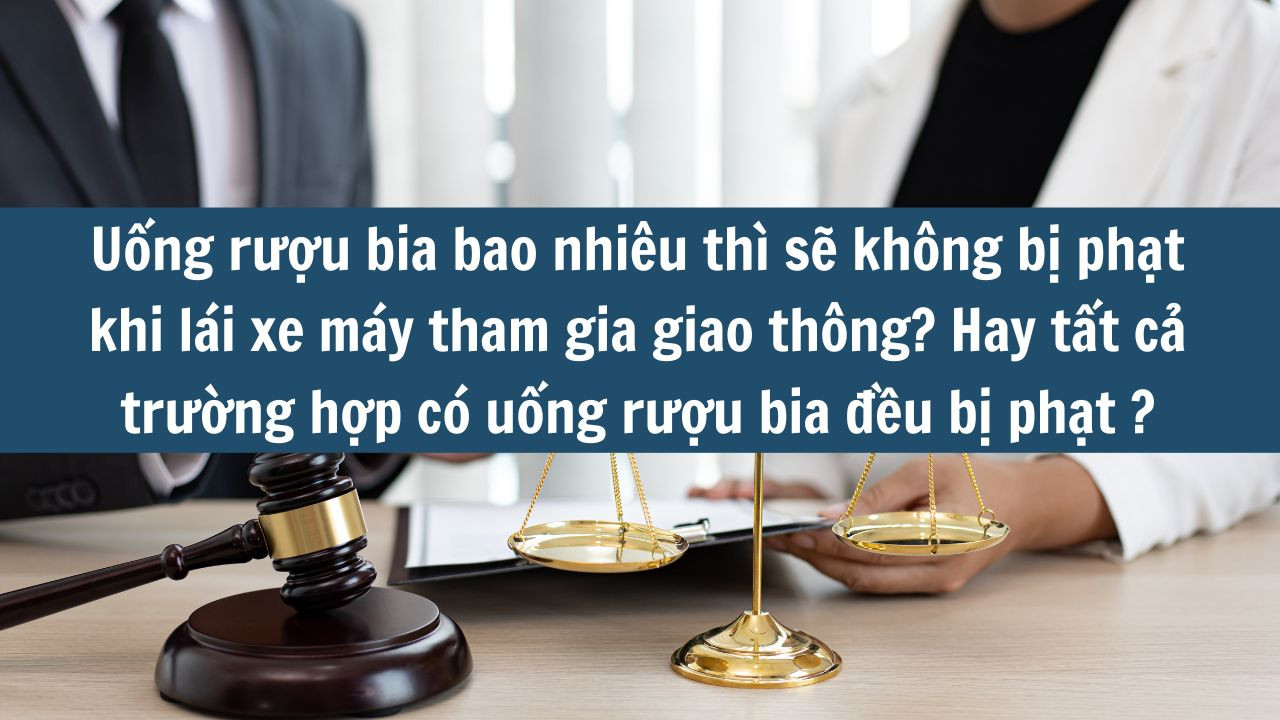
Uống rượu bia bao nhiêu thì sẽ không bị phạt khi lái xe máy tham gia giao thông? Hay tất cả trường hợp có uống rượu bia đều bị phạt mới nhất 2025?
Uống rượu bia bao nhiêu thì không bị phạt khi lái xe máy? Đây là câu hỏi được nhiều người quan tâm khi tham gia giao thông. Theo quy định pháp luật hiện hành, liệu có ngưỡng nồng độ cồn an toàn hay mọi trường hợp sử dụng rượu bia đều bị xử phạt? Bài viết này sẽ giải đáp chi tiết và cập nhật những quy định mới nhất về nồng độ cồn đối với người điều khiển xe máy. 06/01/2025Nồng độ cồn 0.53 phạt bao nhiêu tiền mới nhất 2025?
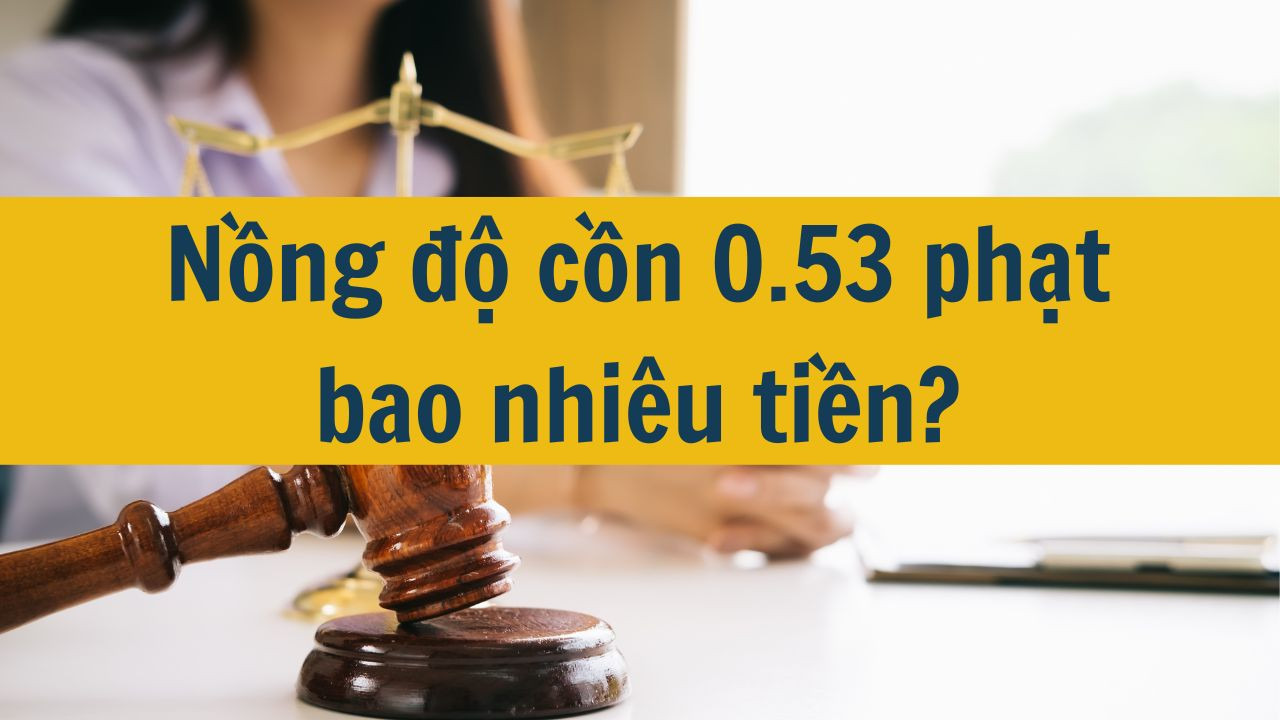
Nồng độ cồn 0.53 phạt bao nhiêu tiền mới nhất 2025?
Nồng độ cồn 0.53 là mức vi phạm phổ biến khi tham gia giao thông. Tuy nhiên, mức phạt đối với vi phạm này sẽ phụ thuộc vào các quy định hiện hành của pháp luật. Trong bài viết này, chúng tôi sẽ cung cấp thông tin chi tiết về mức phạt khi bị phát hiện vi phạm nồng độ cồn 0.53, giúp bạn hiểu rõ hơn về các hình thức xử lý vi phạm giao thông liên quan đến rượu bia. 21/01/2025Nồng độ cồn 4.5 phạt bao nhiêu tiền mới nhất 2025?
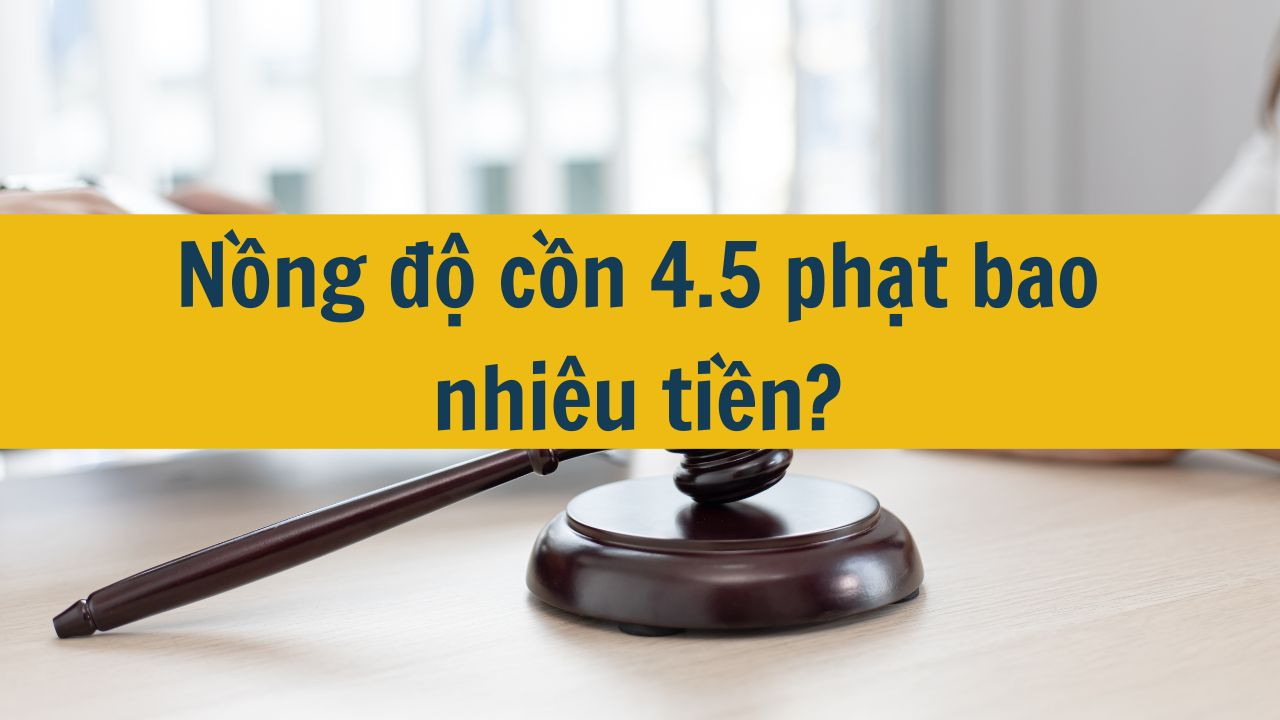
Nồng độ cồn 4.5 phạt bao nhiêu tiền mới nhất 2025?
Nồng độ cồn 4.5 là mức vi phạm phổ biến khi tham gia giao thông. Điều này không chỉ gây nguy hiểm cho bản thân và người khác mà còn bị xử lý nghiêm khắc theo quy định pháp luật. Vậy nồng độ cồn 4.5 sẽ bị phạt bao nhiêu tiền? Cùng tìm hiểu mức phạt và các quy định liên quan trong bài viết dưới đây để hiểu rõ hơn về quyền lợi và nghĩa vụ khi tham gia giao thông 21/01/2025Nồng độ cồn 0.47 phạt bao nhiêu tiền mới nhất 2025?
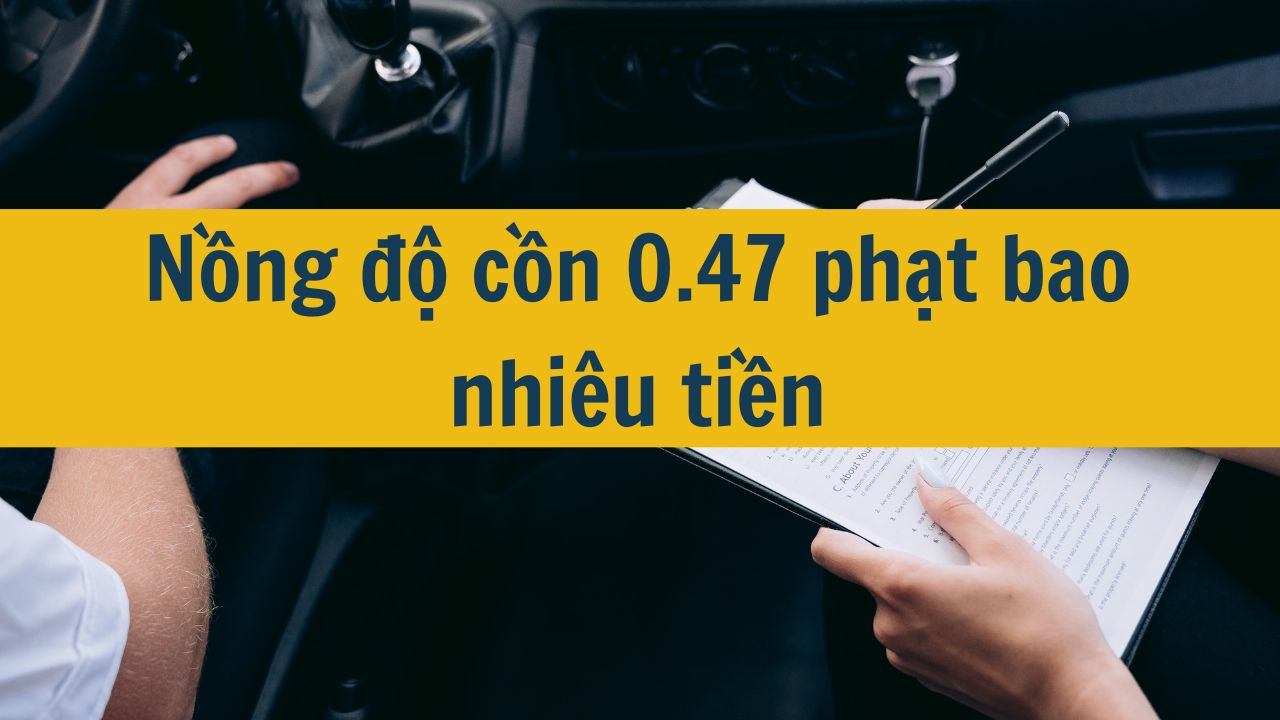
Nồng độ cồn 0.47 phạt bao nhiêu tiền mới nhất 2025?
Khi điều khiển phương tiện giao thông, nồng độ cồn vượt quá mức cho phép có thể gây ra hậu quả nghiêm trọng. Vậy nếu nồng độ cồn là 0.47, người vi phạm sẽ bị xử phạt như thế nào? Bài viết dưới đây sẽ giúp bạn hiểu rõ về mức phạt, quy định của pháp luật liên quan và cách thức xử lý đối với hành vi này. 21/01/2025Mức phạt nồng độ cồn xe máy dưới 0,4 mới nhất 2025
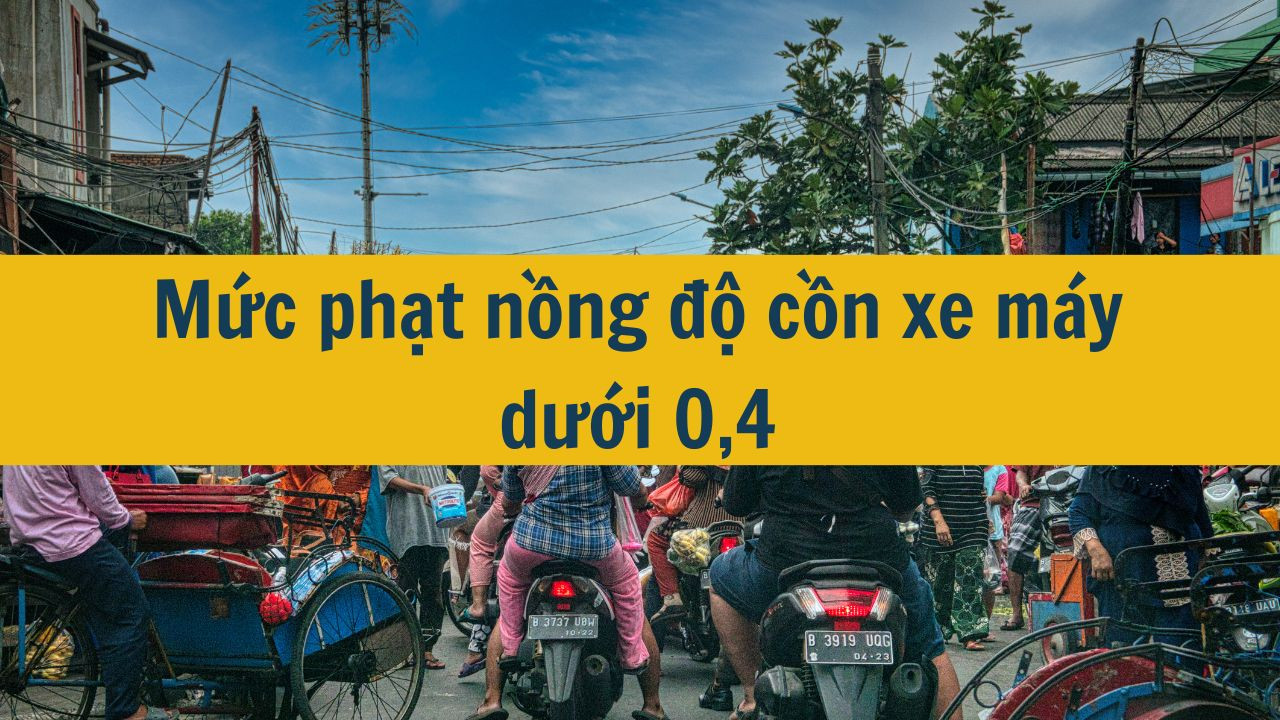

 Luật xử lý vi phạm hành chính 2012 (Bản Word)
Luật xử lý vi phạm hành chính 2012 (Bản Word)
 Luật xử lý vi phạm hành chính 2012 (Bản Pdf)
Luật xử lý vi phạm hành chính 2012 (Bản Pdf)